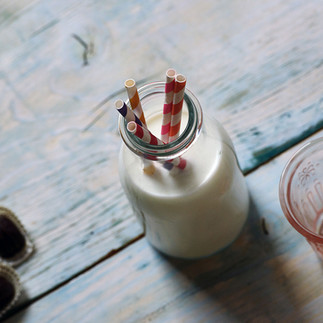Debunking the Myth: Are Dairy Products Really Bad For Singers?
- trysarah1
- Jan 22, 2025
- 3 min read
For years, the belief that dairy products are the sworn enemy of singers has been passed around like an old wives’ tale. You’ve likely heard it before: “Don’t drink milk before a performance; it’ll ruin your voice!” But is there any truth to this? As with many myths, the answer is more nuanced than the blanket ban often suggested. Let’s dive into the science and separate fact from fiction.
Where Did the Myth Come From?
The idea that dairy products are bad for singers stems primarily from their association with mucus production. Many singers claim that consuming milk, cheese, or yoghurt leaves their throat feeling coated and their voice less clear. This anecdotal evidence has led to the widespread assumption that dairy is a universal vocal antagonist.
However, research doesn’t entirely back this up. Studies have shown that dairy products don’t directly increase mucus production. Instead, what some people experience is a temporary thickening of saliva, which might feel like excess mucus but isn’t the same thing. For most people, this sensation is mild and short-lived.
The Truth About Dairy and Singing
While the sensation of thicker saliva can be distracting for some singers, it doesn’t mean that dairy will “ruin” your voice. In fact, many singers consume dairy regularly with no negative effects. Here’s what we know:
1. Individual Responses Vary
Some people may be more sensitive to the effects of dairy, experiencing more pronounced throat-coating sensations. For others, dairy has no noticeable impact. It’s important to pay attention to your own body and how it reacts.
2. It’s About Timing
If you’re worried about feeling phlegmy, avoid dairy immediately before singing. However, this doesn’t mean you need to cut it out altogether. Consuming dairy earlier in the day or the night before a performance is unlikely to affect your vocal clarity.
3. Dairy Isn’t Inherently “Bad” for Your Voice
Milk and other dairy products are excellent sources of nutrients like calcium, protein, and vitamins D and B12, which support overall health. A healthy body often equals a healthy voice. Restricting your diet unnecessarily could deprive you of these benefits.
4. Hydration Is Key
If you’re concerned about the temporary thickening effect of dairy, staying hydrated is the simplest solution. Water can help thin out saliva and keep your vocal folds in optimal condition.
Breaking Down the Mucus Myth
One study published in the Journal of the American College of Nutrition found no significant link between dairy consumption and increased mucus production. The belief likely persists because of the way dairy interacts with saliva, altering its texture rather than its quantity. This can feel different on the vocal folds, but it doesn’t hinder their function in any meaningful way.
For singers prone to acid reflux, however, certain dairy products might exacerbate symptoms, as they can be high in fat. This isn’t a universal issue but something to consider if reflux affects your vocal health.
Practical Tips for Singers
If you’re still hesitant about dairy, here’s how to navigate it:
• Experiment and Observe
Try consuming small amounts of dairy at different times to see how it affects you. Keep a journal if needed to track patterns.
• Don’t Overdo It
While dairy isn’t the villain it’s made out to be, overindulgence in rich, creamy foods might make anyone feel sluggish. Moderation is key.
• Focus on Hydration
Regardless of your diet, staying well-hydrated is the most important factor for vocal health. Drink plenty of water throughout the day, especially before singing.
• Listen to Your Body
If you find dairy consistently causes discomfort or affects your singing, it’s fine to avoid it, but do so based on your personal experience rather than broad myths.
Conclusion
The idea that dairy products are inherently bad for singers doesn’t hold up to scrutiny. While some individuals may feel temporary effects, these are neither universal nor harmful to vocal performance. By understanding your own body and managing your diet thoughtfully, you can enjoy dairy without fear of compromising your voice. So, if you love a good cup of tea with milk or a slice of cheese on toast, there’s no need to give it up in the name of singing.
Remember: the key to a healthy voice is balance, hydration, and knowing what works for you. Dairy is not the enemy—it’s just another ingredient in the rich and varied diet that supports a singer’s craft.













